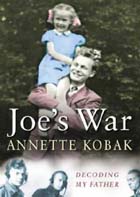Book Review: Joe's War: My Father Decoded
This unfailingly absorbing and moving personal history of one man's Second World War odyssey is an outstanding contribution to our understanding of the wider drama within which it is set.


The Second World War produced the greatest forced migrations in human history. Some brought escape from a Nazi tyranny, a Soviet tyranny, or just war itself. For the vast majority of those swept up, the consequences were, as we know, tragic. But for some, flight meant freedom and ultimately happiness. It took 10 years to restore those survivors to where they sought to be. I fancy that for most of them the war had become a traumatic experience to be buried. All had seen terrible things, some had been part of terrible events. Many thousands of children brought up in the West after the war knew little of the ordeals of their parents during the years. The literature of the time has an enduring poignancy and fascination.
Joe's War is such a story. The author was a clever girl growing up in Britain in the 1950s, preparing to go to Cambridge. She was unsettled by the silences and unexplained gloom of her father, which both she and her mother had to take for granted. Only when she was married with children did she resolve to crack her family mystery.
By this time, her parents were living in Australia, and so an odyssey which had started in Lwow, Poland, in 1939, fleeing east from the Nazis only to find the Red Army moving west, ended in New South Wales in 1971. After escaping from Soviet imprisonment, her father had set off via Budapest, Venice, Rome, France, where he fought with the Free Poles, from Bordeaux to Liverpool, to Scotland, ending up in London in 1941, where he spent the rest of the war decoding Russian messages.
But what had he made of it all? Joe's journey, his daughter found, was only one layer of his internal story. There were hidden political undertones, to do with the betrayal of the Czechs after Munich and of the Poles after 1944. Above all, there were the long and dark shadows of the Cold War which affected so traumatically a generation of exiles from central Europe.
Annette Kobak skilfully weaves her own voyage of discovery, as she retraces Joe's steps through Europe, with his own tortured efforts to make sense of his, Poland's, and Europe's purgatory. The personal and historical narratives are intertwined in a story which is skilfully unfolded and unfailingly absorbing and moving. This is an outstanding contribution to our understanding of the wider drama within which it is set.
Sign up for the Country Life Newsletter
Exquisite houses, the beauty of Nature, and how to get the most from your life, straight to your inbox.
Country Life is unlike any other magazine: the only glossy weekly on the newsstand and the only magazine that has been guest-edited by HRH The King not once, but twice. It is a celebration of modern rural life and all its diverse joys and pleasures — that was first published in Queen Victoria's Diamond Jubilee year. Our eclectic mixture of witty and informative content — from the most up-to-date property news and commentary and a coveted glimpse inside some of the UK's best houses and gardens, to gardening, the arts and interior design, written by experts in their field — still cannot be found in print or online, anywhere else.
-
 Everything you need to know about private jet travel and 10 rules to fly by
Everything you need to know about private jet travel and 10 rules to fly byDespite the monetary and environmental cost, the UK can now claim to be the private jet capital of Europe.
By Simon Mills
-
 'I'd willingly give a year of my life for a fortnight there': The green dream that is the garden of Derreen
'I'd willingly give a year of my life for a fortnight there': The green dream that is the garden of DerreenExotic woods, labyrinths of narrow, mossy paths and thousands of tree ferns make this an internationally important garden, writes Charles Quest-Ritson. Photographs by Jonathan Hession.
By Charles Quest-Ritson